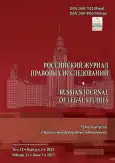Implementation of Pacta Sunt Servanda in Contemporary Environment
- Authors: Chipiga I.V.1,2
-
Affiliations:
- Lomonosov Moscow State University
- Moscow Academy of the Investigative Committee of the Russian Federation
- Issue: Vol 12, No 2 (2025)
- Pages: 39-44
- Section: Trending topic
- URL: https://journal-vniispk.ru/2410-7522/article/view/313640
- DOI: https://doi.org/10.17816/RJLS680060
- EDN: https://elibrary.ru/FFJWZP
- ID: 313640
Cite item
Abstract
Pacta sunt servanda is a key principle of international and national law. The paper discusses its international implementation to ensure consistent development and strengthening of international relations from the 12th century to the present day and how this principle is enshrined and implemented in international and national law. In addition, the paper discusses the integration of this principle in the Constitution of the Russian Federation and responsible relations of Russia with the Council of Europe and the European Court of Human Rights. The authors analyze the issues associated with the principle of pacta sunt servanda and provide examples of its violation, including the actions of the UK in Yemen, when the UK had committed not to use force and violated its commitments; the violation of the principles of non-use of force and diplomatic conflict resolution by the United States; its violation by the European Court of Human Rights, which does not comply with and distorts the principles of the European Convention on Human Rights and the Charter of the United Nations and exerts political pressure on the parties to the Convention. The authors discuss the position of the Constitutional Court of the Russian Federation on the implementation and non-violation of this principle in the Russian legal environment. At the international level, to implement the principle of pacta sunt servanda, it is required to enhance confidence between states and reduce international tensions.
Full Text
##article.viewOnOriginalSite##About the authors
Ilya V. Chipiga
Lomonosov Moscow State University; Moscow Academy of the Investigative Committee of the Russian Federation
Author for correspondence.
Email: ilya-archangel@yandex.ru
SPIN-code: 5439-8598
Russian Federation, Moscow; Moscow
References
- Batyrev GT. Pacta sunt servanda: evolution and ambiguity of internal content. Moscow University Bulletin. Series 11. Law. 2020;(1):86–94. EDN: OXDAVT
- Kapustin MN. International law: lecture notes. In: Anufrieva LP, Arkhipova LB, Ershchov VV, editors. Golden fund of the russian science of international law. Vol. 1. Moscow: Mezhdunarodnye otnosheniya; 2007. P. 167–248.
- Garagurbanli RR. Legal and practical aspects of observing the principle of pacta sunt servanda in modern conditions. Gosudarstvennaya sluzhba i kadry. 2024;(3):237–246. doi: 10.24412/2312-0444-2024-3-237-246 EDN: KLMBPC
- Rumyantsev VP. Covert operations of the British special services in Yemen, 1962–1964. Izvestiya of Altai State University. Historical sciences and archeology. 2024;(3):50–57. EDN: CSGIUB doi: 10.14258/izvasu(2024)3-06
- Chipiga IV. Legal entropy in international law. Russian Journal of Legal Studies. 2023;10(2):117. doi: 10.17816/RJLS322823 EDN: TADRMT
Supplementary files







